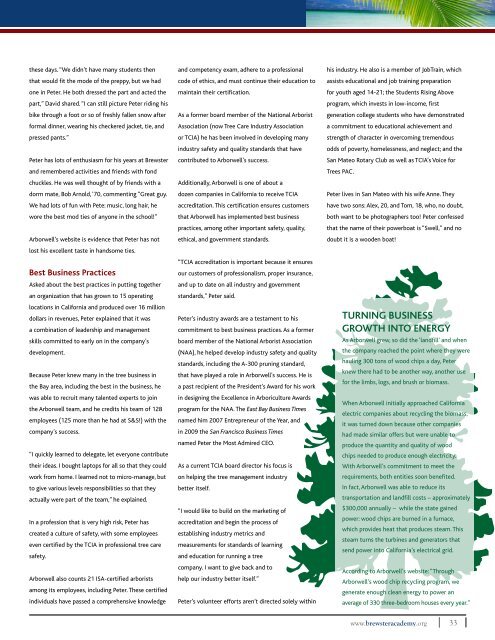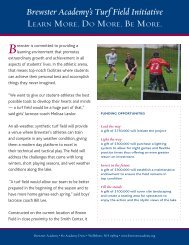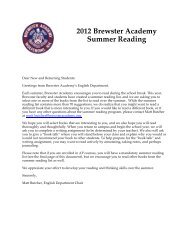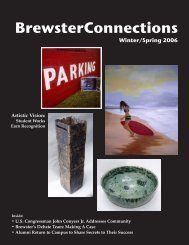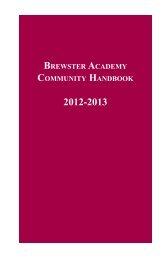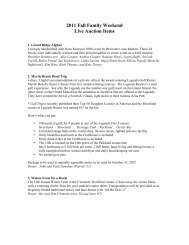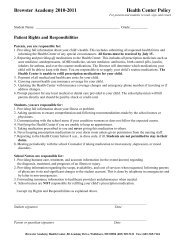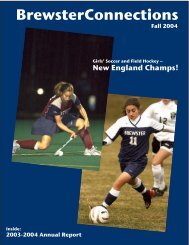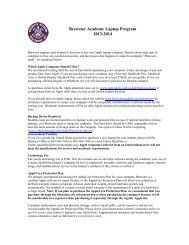BrewsterConnections - Brewster Academy
BrewsterConnections - Brewster Academy
BrewsterConnections - Brewster Academy
You also want an ePaper? Increase the reach of your titles
YUMPU automatically turns print PDFs into web optimized ePapers that Google loves.
these days. “We didn’t have many students then<br />
that would fit the mode of the preppy, but we had<br />
one in Peter. He both dressed the part and acted the<br />
part,” David shared. “I can still picture Peter riding his<br />
bike through a foot or so of freshly fallen snow after<br />
formal dinner, wearing his checkered jacket, tie, and<br />
pressed pants.”<br />
Peter has lots of enthusiasm for his years at <strong>Brewster</strong><br />
and remembered activities and friends with fond<br />
chuckles. He was well thought of by friends with a<br />
dorm mate, Bob Arnold, ‘70, commenting “Great guy.<br />
We had lots of fun with Pete: music, long hair, he<br />
wore the best mod ties of anyone in the school!”<br />
Arborwell’s website is evidence that Peter has not<br />
lost his excellent taste in handsome ties.<br />
Best Business Practices<br />
Asked about the best practices in putting together<br />
an organization that has grown to 15 operating<br />
locations in California and produced over 16 million<br />
dollars in revenues, Peter explained that it was<br />
a combination of leadership and management<br />
skills committed to early on in the company’s<br />
development.<br />
Because Peter knew many in the tree business in<br />
the Bay area, including the best in the business, he<br />
was able to recruit many talented experts to join<br />
the Arborwell team, and he credits his team of 128<br />
employees (125 more than he had at S&S!) with the<br />
company’s success.<br />
“I quickly learned to delegate, let everyone contribute<br />
their ideas. I bought laptops for all so that they could<br />
work from home. I learned not to micro-manage, but<br />
to give various levels responsibilities so that they<br />
actually were part of the team,” he explained.<br />
In a profession that is very high risk, Peter has<br />
created a culture of safety, with some employees<br />
even certified by the TCIA in professional tree care<br />
safety.<br />
Arborwell also counts 21 ISA-certified arborists<br />
among its employees, including Peter. These certified<br />
individuals have passed a comprehensive knowledge<br />
and competency exam, adhere to a professional<br />
code of ethics, and must continue their education to<br />
maintain their certification.<br />
As a former board member of the National Arborist<br />
Association (now Tree Care Industry Association<br />
or TCIA) he has been involved in developing many<br />
industry safety and quality standards that have<br />
contributed to Arborwell’s success.<br />
Additionally, Arborwell is one of about a<br />
dozen companies in California to receive TCIA<br />
accreditation. This certification ensures customers<br />
that Arborwell has implemented best business<br />
practices, among other important safety, quality,<br />
ethical, and government standards.<br />
“TCIA accreditation is important because it ensures<br />
our customers of professionalism, proper insurance,<br />
and up to date on all industry and government<br />
standards,” Peter said.<br />
Peter’s industry awards are a testament to his<br />
commitment to best business practices. As a former<br />
board member of the National Arborist Association<br />
(NAA), he helped develop industry safety and quality<br />
standards, including the A-300 pruning standard,<br />
that have played a role in Arborwell’s success. He is<br />
a past recipient of the President’s Award for his work<br />
in designing the Excellence in Arboriculture Awards<br />
program for the NAA. The East Bay Business Times<br />
named him 2007 Entrepreneur of the Year, and<br />
in 2009 the San Francisco Business Times<br />
named Peter the Most Admired CEO.<br />
As a current TCIA board director his focus is<br />
on helping the tree management industry<br />
better itself.<br />
“I would like to build on the marketing of<br />
accreditation and begin the process of<br />
establishing industry metrics and<br />
measurements for standards of learning<br />
and education for running a tree<br />
company. I want to give back and to<br />
help our industry better itself.”<br />
Peter’s volunteer efforts aren’t directed solely within<br />
his industry. He also is a member of JobTrain, which<br />
assists educational and job training preparation<br />
for youth aged 14-21; the Students Rising Above<br />
program, which invests in low-income, first<br />
generation college students who have demonstrated<br />
a commitment to educational achievement and<br />
strength of character in overcoming tremendous<br />
odds of poverty, homelessness, and neglect; and the<br />
San Mateo Rotary Club as well as TCIA’s Voice for<br />
Trees PAC.<br />
Peter lives in San Mateo with his wife Anne. They<br />
have two sons: Alex, 20, and Tom, 18, who, no doubt,<br />
both want to be photographers too! Peter confessed<br />
that the name of their powerboat is “Swell,” and no<br />
doubt it is a wooden boat!<br />
Turning Business<br />
Growth Into Energy<br />
As Arborwell grew, so did the ‘landfill’ and when<br />
the company reached the point where they were<br />
hauling 300 tons of wood chips a day, Peter<br />
knew there had to be another way, another use<br />
for the limbs, logs, and brush or biomass.<br />
When Arborwell initially approached California<br />
electric companies about recycling the biomass,<br />
it was turned down because other companies<br />
had made similar offers but were unable to<br />
produce the quantity and quality of wood<br />
chips needed to produce enough electricity.<br />
With Arborwell’s commitment to meet the<br />
requirements, both entities soon benefited.<br />
In fact, Arborwell was able to reduce its<br />
transportation and landfill costs – approximately<br />
$300,000 annually – while the state gained<br />
power: wood chips are burned in a furnace,<br />
which provides heat that produces steam. This<br />
steam turns the turbines and generators that<br />
send power into California’s electrical grid.<br />
According to Arborwell’s website: “Through<br />
Arborwell’s wood chip recycling program, we<br />
generate enough clean energy to power an<br />
average of 330 three-bedroom houses every year.”<br />
www.brewsteracademy.org<br />
33


